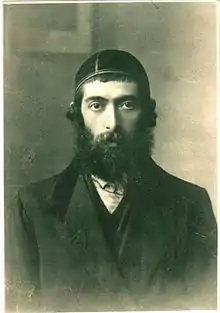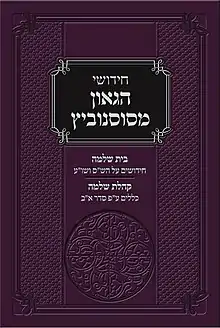Shlomo Sztencl
Shlomo Sztencl (Hebrew: שלמה שטנצל, pronounced Shtentzel) (1884 – 1919) was a Polish Orthodox Jewish rabbi. He served as Chief Rabbi of Czeladź, Poland and Rav, dayan, and rosh yeshiva of Sosnowiec, Poland. He is the author of Koheles Shlomo[1] and Beis Shlomo, the former published posthumously.
Rabbi Shlomo Sztencl | |
|---|---|
 | |
| Personal | |
| Born | Shlomo Sztencl August 16, 1884 Czeladź, Poland |
| Died | August 31, 1919 (aged 35) |
| Religion | Judaism |
| Nationality | Polish |
| Spouse | Miriam Bayla Zweigenhaft |
| Parents | Rabbi Chaim Dov Sztencl Freidel Genendel Shweitzer |
| Denomination | Orthodox |
Family background
Sztencl was born on 16 August 1884 (25 Av 5644) in Czeladź, Poland[2] to Rabbi Chaim Dov (Berish) Sztencl, av beis din of Czeladź and a distinguished Radomsker Hasid. His father's maternal grandfather, Rabbi Dov Berish Hertziger, had conferred the title of Rebbe upon Rabbi Shlomo HaCohen Rabinowitz, the first Rebbe of the Radomsk Hasidic dynasty. Sztencl's mother, Freidel Genendel, was the daughter of Rabbi Shweitzer of Bendin. Her father was an extremely wealthy and benevolent man. One of his famous charitable deeds was sending wagons of potatoes every Friday to the Divrei Chaim of Sanz for distribution to the poor.[3]
Freidel Genendel's sister, Miriam Kayla, married Hanoch Hendel Frumer. Their son, Rabbi Aryeh Tzvi Frumer, became a renowned rabbi and rosh yeshiva of Yeshivas Chachmei Lublin.[3] Aryeh Tzvi and his first cousin, Shlomo Sztencl, were childhood friends and remained close. After Sztencl's untimely death, Frommer established a close relationship with his orphaned children. Frumer was also very involved in the first publication of Sztencl's manuscript, Koheles Shlomo.[3]
Shlomo had one brother, Avraham Nochum (1897–1983), and two sisters, Esther and Tsime.[4] Avraham Nochum left home at age 20 and moved to Berlin, where he became a noted Yiddish poet.[5]
Biography

From an early age, Sztencl was known as a genius who could grasp difficult concepts with ease.[4][6] At age 11, he was far advanced over his peers and his father sent him to the yeshiva of Amstov, which had a rigorous academic program.[3][7] In 1897, several months before his bar mitzvah, Shlomo traveled to Berzeznitz to study with its Chief Rabbi, Rabbi Yaakov Yosef HaCohen Rabinovitch, author of Emes LeYaakov.[8] Rabinovitch was very fond of the young Shlomo, and treated him as his prize student. Several months later, when he was appointed Chief Rabbi of Klabotsk, Rabinovitch took Shlomo with him. After studying with Rabbi Rabinovitch for a year and a half, Shlomo returned to the yeshiva of Amstov to study for another year. In the winter of 5661 (1900–1901), he studied with the Avnei Nezer for six months. In the summer of 5661 (1901), he returned home to Czeladź.[3]
Several days after his eighteenth birthday, on September 10, 1902, Sztencl married Miriam Bayla, daughter of Rabbi Efraim Mordechai Mottel Zweigenhaft.[3] The Zweigenhaft family was renowned as a distinguished family of shochtim.[9] Following his marriage, Sztencl began writing a diary, in which he kept a cheshbon hanefesh (lit. "soul-reckoning"),[10] accounting for every minute of his time.[11] This diary was kept under lock and key and was discovered only after his death.[3] The contents of Sztencl's diary reveal his intense fear of Heaven. He routinely repented for actions and thoughts which only a man of his stature would consider sins, such as too much "frivolous talk", or thinking about Torah subjects in forbidden places or times, or wasting moments he could have devoted to Torah study. He also repented for neglecting to invite a poor man for a meal in his home.[10]
At the young age of 21, Sztencl was appointed Rabbi of Czeladź.[3] Four years later, he moved to the town of Sosnowiec and was appointed Rabbi and dayan. He also led a yeshiva with many students.[6] He was highly respected, and some of his halachic rulings were printed in leading religious publications of the era.[6]
At age 34, after ten years in Sosnowiec, Sztencl became seriously ill. His doctor advised him to go to natural springs far away from his home.[3] His father looked after him there. Sztencl died on August 31, 1919 (5 Elul 5679)[11] at the age of 35.
Family
One of Sztencl's sons, Rabbi Yonah Sztencl (1904–1969), immigrated to Palestine in 1935 and served as a Rav in Tel Aviv and director of that city's kashrut department. The younger Sztencl was best known as the originator of the Mishnah Yomis and Halacha Yomis study programs,[12] which are currently administered by his son, Rabbi Shlomo Sztencl, who is named after his grandfather.[4]
Ester (1913-1943), who was one of Sztencl's daughters, was married to Rabbi Shlomo Zev Zweigenhaft.[13] Prior to the Holocaust, Zweigenhaft served as one of Poland's Rosh Hashochtim.[13][14][15] After surviving the Holocaust, Zweigenhaft served as Chief Rabbi of Hannover and Lower Saxony in Germany before emigrating to the United States.[13][14][15]
Works
Sztencl had mentioned many times that he didn't want any of his original Torah insights published before he reached the age of 40, when, as the Mishna states, a person acquires "understanding".[3] Yet with the approval of several of the greatest Torah scholars in Europe, among them Rabbi Chaim Ozer Grodzinski and Rabbi Menachem Zemba, Sztencl's sons decided to publish his writings. Sztencl's father collected and prepared his son's writings for publication. The manuscript was then divided into two books: Koheles Shlomo and Beis Shlomo. The former was published in 1932 and reprinted in 1973 by his Israeli descendants.[4] In 2013 Beis Shlomo was published for the first time in one volume together with Koheles Shlomo in Jerusalem. The book was entitled Chidushei Hagaon M'sosnovitz (Novelle of the Genius of Sosnowiec).[16][17]
 Approbation from Rabbi Chaim Ozer Grodzinski of Sztencl's work Kohelet Shlomo
Approbation from Rabbi Chaim Ozer Grodzinski of Sztencl's work Kohelet Shlomo Rabbinic approbation of Rabbi Aryeh Tzvi Frumer for one of Sztencl's books
Rabbinic approbation of Rabbi Aryeh Tzvi Frumer for one of Sztencl's books
References
- שטנצל, שלמה בן חיים דב, 1884-1919. "Sefer Detail: קהלת שלמה - שטנצל, שלמה בן חיים דב, 1884-1919". Hebrewbooks.org. Retrieved 2013-08-22.CS1 maint: multiple names: authors list (link)
- שטנצל, שלמה בן חיים דב, 1884-1919. "Preface to Koheles Shlomo". Hebrewbooks.org. Retrieved 2013-08-22.CS1 maint: multiple names: authors list (link)
- "תולדות חייו של הגאון מסוסנוביץ רבי שלמה שטנצל" [Biography of the Genius from Sosnowiec, Rabbi Shlomo Sztencl] (in Hebrew). tapuz.co.il. 26 July 2012. Retrieved 9 August 2012.
- Greenbaum, Avraham (19 August 2007). "To My Wise and Understanding Son: Avrom-Nokhem Shtensl's Letters from Poland to Germany, 1922-1934". The Mendele Review: Yiddish Literature and Language (186).
- Leftwich, Joseph (1939). The Golden Peacock: An anthology of Yiddish poetry translated into English verse. R. Anscombe. p. 665.
- Gashury, Me'ir Shymon (1974). The Book of Sosnowiec and the Surrounding Region in Zagłębie. 1. Tel Aviv: Sosnowiec Societies in Israel and the United States, France and other countries. p. 142.
- Responsa "Chelkas Yoev" Volume 2 – Biography of Rabbi Shloima Kalish
- רבי יעקב יוסף הכהן רבינוביץ (1908). "Sefer Detail: אמת ליעקב - רבי יעקב יוסף הכהן רבינוביץ". Hebrewbooks.org. Retrieved 2013-08-22.
- Sefer Sosnowiec.
- שטנצל, שלמה בן חיים דב, 1884-1919 (1932). "Introduction to Koheles Shlomo". Hebrewbooks.org. Retrieved 21 February 2019.CS1 maint: multiple names: authors list (link)
- Shmuel Aharon Pardes, ed. (1919). "נאד של דמעות" [Flask of Tears]. Ha-Pardes (Hebrew, הפרדס) (in Hebrew). Piotrków. 2 (4): 34. LCCN 75643728.
- "תקציר תולדותיו של מייסד המפעל רבי יונה שטנצל זצ"ל" [A Short Biography of the Founder of the Project, Rabbi Yonah Sztencl, zt"l] (PDF) (in Hebrew). המפעל ללימוד המשנה וההלכה היומית. 2010. Retrieved 9 August 2012.
- Chidushei Hagaon M'sosnovitz, Jerusalem 2013 (Hebrew) page 18
- Kinyan L'Shabbos Magazine (Hamodia) July 27, 2011
- Dos Yiddishe Vort VOL. LXXIX No. 425 September–October 2011
- http://rotter.name/kolot/prime/39697.php (retrieved December 2013)
- http://seforim.blogspot.com/2013/10/new-seforim.html (retrieved December 2013
External links
| Wikimedia Commons has media related to Shlomo Sztencl. |